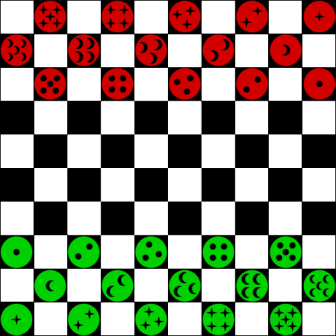

In Salta the object is to move your checkers to the opponent’s starting squares. Checkers must be placed in the same configuration as they begin, although on the other side of the board. (So the three ranks of checkers must be shifted seven ranks forwards.) Checkers can step one square diagonally in any direction or jump diagonally forward over an enemy piece. There are no captures. It is mandatory to jump an enemy checker, but one can only make one jump at a time. It is not permitted to stalemate the opponent.
An optional rule is that the game ends after 120 moves. Then each player calculates the minimum number of moves needed to accomplish their goal. An optional rule is that the game ends after 120 moves. Then each player calculates the minimum number of moves needed to accomplish their goal. Other checkers are ignored on the path of a checker when calculating the minimum number of moves needed to reach its destination. The player with the least number is the winner.
Salta (Italian for “Jump!”) was invented by Konrad Heinrich Büttgenbach, 1899 in Germany. It became very popular in Europe, but disappeared after WWI. Although the checkers move the same, they are called suns, moons, and stars.
Discussion
Salta, played with the original rules, is a tedious game that seldom reaches a resolution. Try instead the alternative variant, suggested by me, where diagonal backwards movement is disallowed until the checker reaches the three farthest ranks. Then it may also step backwards or optionally jump forwards or backwards over a friendly checker. (If the checker backs outside the farthest ranks, it can no longer make backward moves.) With the new rules it’s more difficult to obstruct the opponent’s progress, as one can only go forward until one reaches the other side. Thus, it’s possible to reach a resolution within a reasonable number of moves.
Salta is a pastime game, easy to learn. Yet, it’s not a game of chance, but still depends on good and bad choices. This is probably the explanation for its popularity in the early 20th century. Unlike checkers, it doesn’t require much concentrative effort, and it can be enjoyed by young and adult alike.
Reference
Gering, R. (2001). ‘Salta - The Humanistic Game’. Abstract Games 8, 2001. (here)
☛ You can download my free Salta program here (updated 2019-12-07), but you must own the software Zillions of Games to be able to run it (I recommend the download version).
© M. Winther, 2019 December